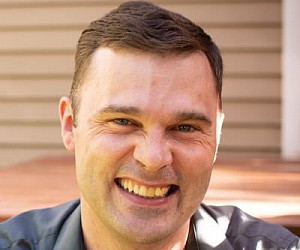main content Do Less to Do More?
A Burnout Scholar’s Innovative Approach to Understanding Workplace Well-Being
Justin Henderson, assistant professor of professional mental health counseling, is an expert on burnout—that chronic fatigue that includes distressing emotions, physical exhaustion, cynicism, psychological overwhelm, and a decline in professional efficacy in the presence of workplace stressors. He notes that experiencing burnout can be harrowing, especially since there’s a general lack of information about how best to address it when it occurs.
Identifying as a Burnout Scholar, Henderson has spent the last four years working to understand the phenomenon, both in order to prevent it, and, if it has already taken hold, to effectively treat it. His innovative approach negates the idea that self-care—that vague concept that somehow time spent with scented candles, yoga, or even prioritizing a favorite hobby, will make us feel rejuvenated and ready to once again tackle our professional responsibilities at full throttle. Why? Because prioritizing time for self-care still means doing more, and it also implies that the cause of burnout exists within the individual rather than the work environment itself.

“A great deal of the public focus on burnout has zeroed in on the skills and deficits of individual workers, while three decades of research has demonstrated that work environments, not individual workers, have the greatest impact on the possibility of burnout and worker turnover.”
What does a workplace designed to prevent burnout look like? Henderson says it must be compassion-centered, and that workplace norms must emphasize well-being as a community-oriented goal, not just an individual worker’s desired outcome.
“Our work environments must change,” he writes. “Our economy and society have often been insensitive to the natural order—taken [things] for granted and assumed an infinite supply of materials to consume. Our work has followed this basic assumption as well—that people will continue to give endlessly of themselves for those productivity margins. But just as our ecological environment burns from the lack of appropriate boundaries and respect for mother earth, our workers are scorched under the lack of boundaries of endless bottom lines.”
Henderson has gone on to explore related topics of worker well-being, including Time is Worth Wasting and All Change Involves Death. Woven throughout his growing body of work is a persistent reminder that in order to do more, we also need to do less. Human beings are not machines, able to produce more just by working faster or for longer hours.
In our current society, with many lured by the merit-based siren call of endless accomplishment and productivity, Henderson’s work feels downright revolutionary.
He is currently investigating the experience of burnout in early career mental health counselors, and his full catalog of articles is available on Substack, aptly titled The Burnout Onion.
More Stories

Andrew Saultz Selected Dean of the Graduate School
Andrew Saultz, an alumnus of L&C’s Master of Arts in Teaching program, begins his tenure on August 4.

McKenzie Darr, EdS School Psychology ’21, Named Oregon School Psychologist of the Year
Now in her fourth year with the Dallas School District, Darr is one of two school psychologists serving students at Whitworth and Oakdale Heights elementary schools, Dallas Community Charter School, and Dallas High School. Last year she served 86 students through the evaluation process and 90 students the year prior.

Grant Piros ’21 Named 2025 Assistant Principal of the Year
Piros was presented with the award at a surprise assembly in front of a gym full of excited middle school students in the fall, and will be formally honored at COSA’s annual Seaside Conference in June 2025.

Advance Your Career Supporting Students in Higher Education
Applications are open for L&C staff interested in pursuing their MA degree in Higher Education Student Affairs at Lewis & Clark Graduate School!